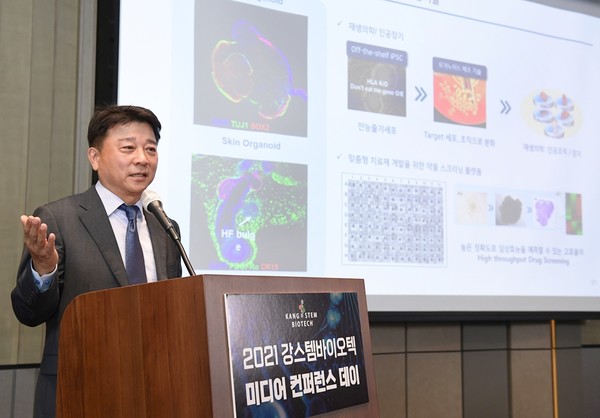Kangstem Biotech’s shares reached their lower limits on Friday after the company reported that its stem cell treatment for atopic dermatitis, FURESTEM-AD Inj., had failed to demonstrate superiority over a placebo in topline phase 3 clinical trial data.

As of 2:50 p.m., the company's shares traded at 2,060 won ($1.49), down 29.93 percent from the previous trading day.
The phase 3 clinical trial aimed to evaluate the efficacy and safety of FURESTEM-AD in patients with moderate to severe chronic atopic dermatitis. Conducted as a multicenter, randomized, double-blind, placebo-controlled study, the primary endpoint was the percentage of patients achieving a 50 percent reduction in the Eczema Area and Severity Index (EASI-50) at 12 weeks.
The ITT (Intention-To-Treat) analysis included 308 participants, with 205 in the treatment group and 103 in the placebo group.
Results showed that 32.95 percent of the treatment group achieved EASI-50 compared to 29.29 percent of the placebo group, with no statistically significant difference. The MPPS (Modified Per-Protocol Set) analysis similarly found no significant difference.
Despite these disappointing results, Kangstem Biotech emphasized a positive trend in the treatment group's EASI-50 rates post-12 weeks, increasing to 58.06 percent by week 24. However, direct comparison beyond 12 weeks was not possible as placebo recipients crossed over to receive FURESTEM-AD.
In response to these findings, Kangstem Biotech CEO Na Jong-cheon acknowledged the trial's failure to meet its primary endpoint but highlighted the long-term potential of FURESTEM-AD during a press conference Friday.
"We aim to leverage the long-term therapeutic efficacy and maintenance characteristics of advanced regenerative treatments to find new breakthroughs," Na said. "We will discuss applying for product approval with the MFDS, pursue licensing for overseas clinical trials, and push for commercialization under Japan's regenerative medicine laws."
The company is also exploring global opportunities, including discussions with the FDA and international pharmaceutical firms.
However, industry experts caution that failing to meet the primary endpoint typically signifies a trial's failure, necessitating a potential re-trial to re-establish efficacy.
Answering questions from reporters of the possibility of a re-trial, Kangstem Biotech Executive Managing Director Bae Yo-han indicated that the decision on re-trials requires further discussion and comprehensive data analysis.
"It's a difficult question to answer right away, but we need to analyze additional data and comprehensively review the results after the topline findings," Bae said.
Related articles
- Kangstem Biotech, P&K Skin Research Center team up for hair loss, anti-aging biz
- Kangstem proves safety of atopic dermatitis stem cell treatment
- Kangstem Biotech reapplies for phase 1/2a IND for osteoarthritis treatment
- Kangstem Biotech withdraws trial application for stem cell-based osteoarthritis treatment
- Doctors advocate for reimbursement of medication switching on World Atopic Dermatitis Day
- Calls mount for cross-dosing of atopic dermatitis treatments to alleviate insurance burdens as Dupixent dominates market
- Misconceptions, treatment strategies addressed for atopic dermatitis in health talk show

